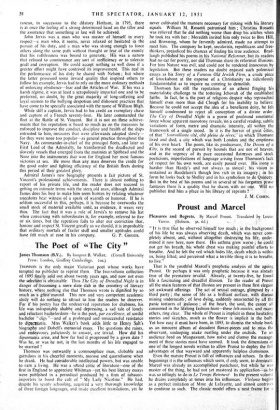The Poet of "The City"
THototsoN is the only major Victorian poet whose works have tempted no publisher to reprint them. The two-volume collection of 1895 finally sold out about twenty years ago, and now not even the selection is obtainable. Thus The City of Dreadful Night is in danger of .becoining a mere slate slab in the cemetery of literary history, where nothing else that Thomson wrote is dignified by so much as a ens' mound This new and very competent academic study will do nothing to attract to him the readers he deserves. For if his poetry has the undeserved reputation for drabness, his life was indisputably shabby and depressing, a sad tale of lonely and reluctant bachelordom—he is the poet, par excellence, of sordid bachelor "digs "—and of a prolonged and unsuccessful resistance to dipsimania. Miss Walker's book adds little to Henry Salt's biography and Dobell's memorial essay. The questions she raises, and endeavours judiciously to answer, are trivial. How did his dipsomania arise, and how far had it progressed by a given date ? Was he, or was he not, in the last months of his life engaged to be married ?
Thomson was outwardly a commonplace man, clubable and garrulous in his cheerful moments, morose and quarrelsome when he drank. He had considerable intellectual powers, but was unable to earn a living. He was a sillind critic of literature—one of the first in England to appreciate Whitman—yet his best literary essays were published in a periodical produced by a firm of tobacco- importers to boost the cult of " My Lady Nicotine." He had, despite his scanty schooling, acquired a very thorough knowledge of three foreign languages, and made excellent translations, yet he
never cultivated the manners necessary for mixing with his literary equals. William M. Rossetti patronised him ; Christina Rossetti was relieved that he did nothing worse than drop his aitches when he took tea with her ; Meredith invited him only twice to Box Hill, and Browning, whom he fervently admired, made no attempt to meet him. The company he kept, secularists, republicans and free- thinkers, prejudiced his chances of finding his true audience. Brad. laugh published his poems in his National Reformer, but its readers had no car for poetry, nor did Thomson share its reformist illusions. For him Nature was evil, and could not be rendered innocuous. by legislation. But these readers no doubt enjoyed such polemical essays as his Story of a Famous Old Jewish Firm, a crude piece of knockabout at the expense of a Christianity so ridiculously fundamentalist as to require no cunning to demolish. Thomson has still the reputation of an atheist flinging his materialistic challenge to the tottering Jehovah of the established faiths. In fact, he is the poet of religious despair who reproached himself even more than did Clough for his inability to believe. Because he could not accept the idea of a beneficent deity, he felt himself condemned to reject all conception of a divine order. The City of Dreadful Night is a poem of profound emotional force whose apparent monotony reveals,"bn a careful reading; subtle variations of form, metre and dramatic intensity, all within the framework of a single mood. In it is the horror of great cities, of that " fourmillante cite, cite pleine de rives," in which Thomson lived and died, a city which was both London and the emptiness of his own heart. The poem, like its predecessor, The Doom of a City, is the record of pursuit by hounds that are not of heaven, and in the urgency of its pace occasional flatntsses and stock poeticisms, imperfections of language arising from Thomson's lack of respect for his own work, are easily passed over. His irony is harsher than Hardy's and not always as stoical ; his vision as sustained as Baudelaire's though less rich in its imagery ; in his form he looks back to Shelley and in his symbolism to de Quincey. But in the best of his poems and in several.of his forgotten lose fantasies there is a quality that he shares with no one. Will no publisher find him a place in his library of reprints?
J. M. COHEN.


































 Previous page
Previous page